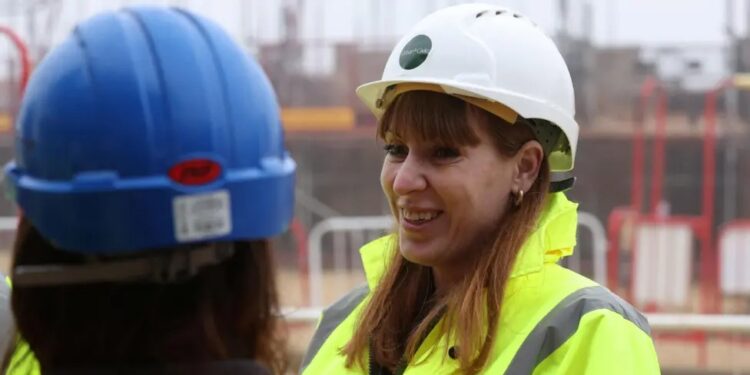In a shocking revelation that promises to knock everyone over backwards with disbelief, the U.K. building industry’s leaders have warned that Britain doesn’t have enough construction workers to create the 1.5 million new homes Labour has insisted it’s going to have built in five years.
The BBC has the story:
Tens of thousands of new recruits are needed for bricklaying, groundworks and carpentry to get anywhere near the target, they told the BBC.
The Home Builders Federation (HBF), along with the U.K.’s largest housebuilder Barratt Redrow said skills shortages, ageing workers and Brexit were some of the factors behind the shrinking workforce.
The Government confirmed there was a “dire shortage” of construction workers but said it was “taking steps to rectify” the problem.
Last week, Prime Minister Sir Keir Starmer repeated the pledge he made soon after taking power to deliver 1.5 million new homes in England by 2029.
The pledge means 300,000 new homes a year, ratcheting up from the current figure of about 220,000.
But for every 10,000 new homes to be built, the sector needs about 30,000 new recruits across 12 trades, according to the HBF, the trade body for the house building industry in England and Wales.
Based on the Government’s plans, the estimated number of new workers required for some common trades, for example, would be:
- 20,000 bricklayers
- 2,400 plumbers
- 8,000 carpenters
- 3,200 plasterers
- 20,000 groundworkers
- 1,200 tilers
- 2,400 electricians
- 2,400 roofers
- 480 engineers
When asked if there were enough workers currently to build the extra homes, David Thomas, Chief Executive of Barratt Redrow, said: “The short answer is no.”
Of course, if Britain had unlimited suitable land and services, and a vast pool of currently unemployed but trained workers champing at the bit to get stuck in, the story might be a different one. But let’s not forget this is a government expecting simultaneously to carpet the country with solar farms and wind turbines, and also supercharge the manufacturing and installation of heat pumps as well as car charging points.
Millions of people out of work and with no intention of going back to work is part of the problem too. But so is the shortage of skills:
Barratt Redrow boss Mr. Thomas said recruitment had not been helped by a drive in past decades to encourage young people into further education rather than trades.
“If you went back to the 60s and 70s, I think parents, teachers and the government were very happy with the idea that people became trades – electricians, plumbers, bricklayers,” he said.
The average rates of pay for these jobs “are high” but the issue was “more about availability of labour with skills”, he said.
The Telegraph covers the same story, pointing out that 2.5 new homes would need to be completed every minute. Nonetheless:
Matthew Pennycook, the housing minister, has already admitted that delivering the manifesto pledge is “more difficult than expected”, but remained “convinced” it is achievable.
John Cooper, of snagging firm New Home Quality Control, said the drive to build will cause quality control to slip.
He said: “New builds are in such a bad state already as there aren’t enough good quality tradesmen out there to cope.
“So you can only imagine the whole world of mess we’ll be in when housebuilding increases to this degree.
“I don’t see a good end coming to this at all – it’s only going to go downhill. The Government hasn’t thought about how these houses are going to get built.
Then there’s the problem of how building firms can fund the construction projects:
Gareth Belsham, Director of Bloom Building Consultancy, said: “Housebuilding is stuck in reverse.
“Residential construction has contracted for two months in a row and November’s decline was the fastest seen since summer.
“With residential developers still chafing at high interest rates – which make it more expensive for them to buy land and build homes – and patchy consumer demand, the Government’s promise is looking ever more pie in the sky.”
There are plenty of other problems, among them an ageing workforce. The best prediction is that 1.12 million more homes might be built by the end of the Parliament, but it’s anyone’s guess whether they’ll be up to scratch. They’ll also add massively to the load on providing utilities, communications and meeting environmental regulations.
It’s not always possible to predict the future but in this case it’s hardly a challenge. Labour’s comedy house building target is already irrevocably doomed.
The BBC’s story is worth reading in full, and so is the Telegraph’s.













To join in with the discussion please make a donation to The Daily Sceptic.
Profanity and abuse will be removed and may lead to a permanent ban.